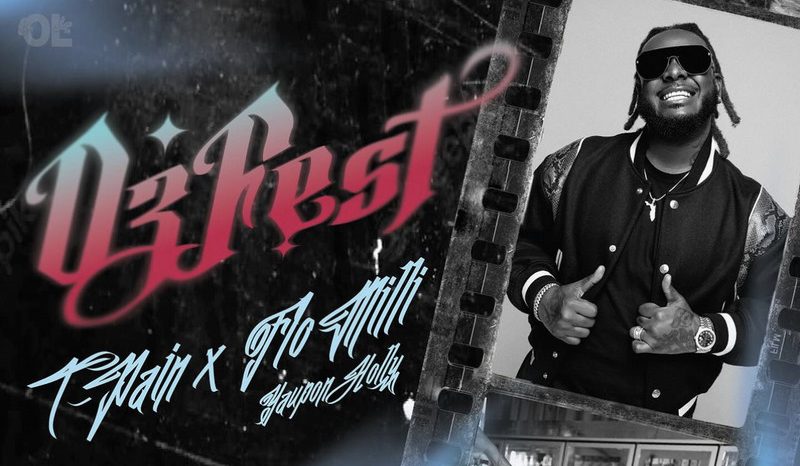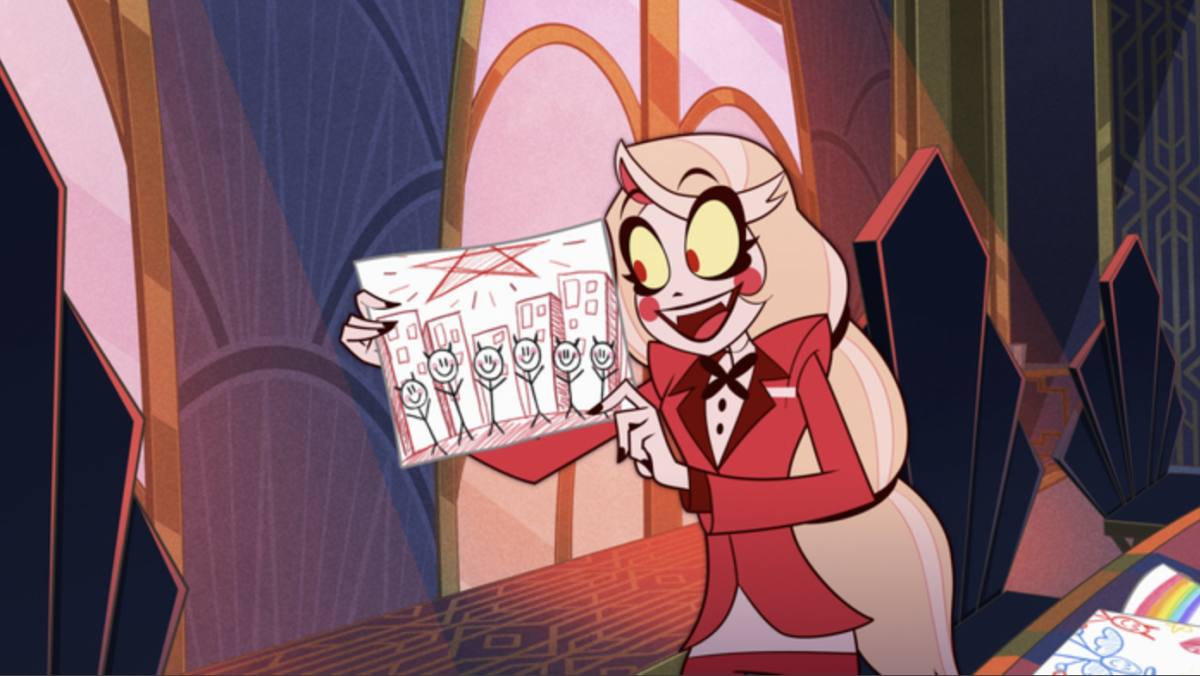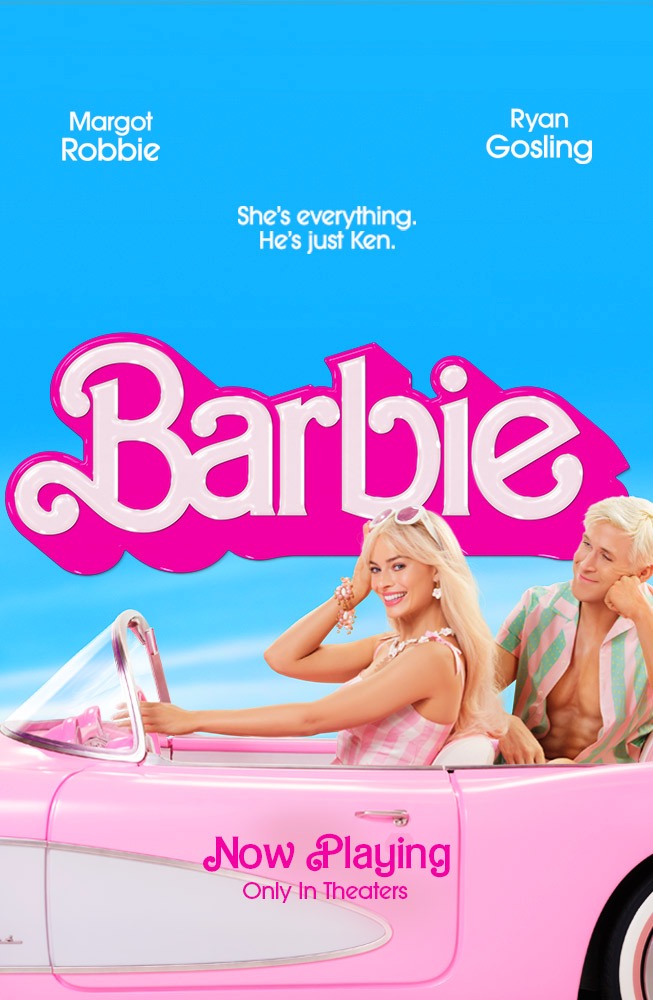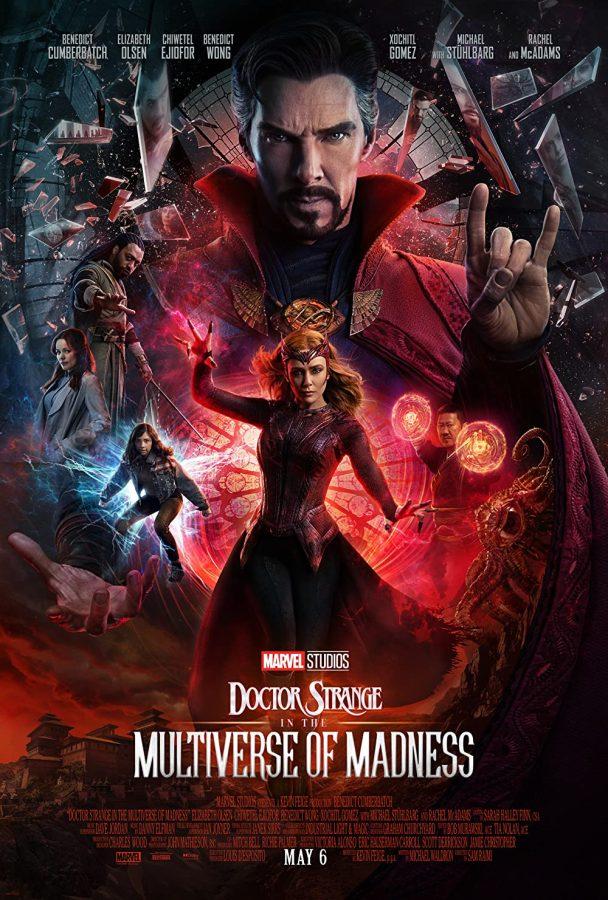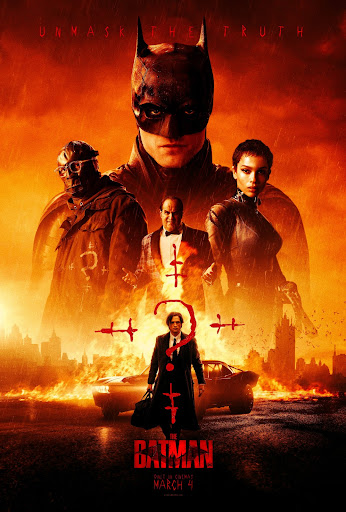In 1988, hip-hop group N.W.A released their infamous debut album Straight Outta Compton, launching West Coast gangsta rap into the mainstream and giving the city of Compton, California worldwide recognition. N.W.A’s influential style combined innovative production with violent and misogynistic lyrics. They rapped about police brutality, the lucrative drug trade and do-or-die gang violence. N.W.A condemned the lifestyle, but they were accused of glamorizing and promoting it. When asked about this, Dr. Dre said N.W.A’s art was a reflection of the reality they saw around them. The 2015 film Straight Outta Compton presents that reality through executive producers Ice Cube and Dr. Dre’s perspective.
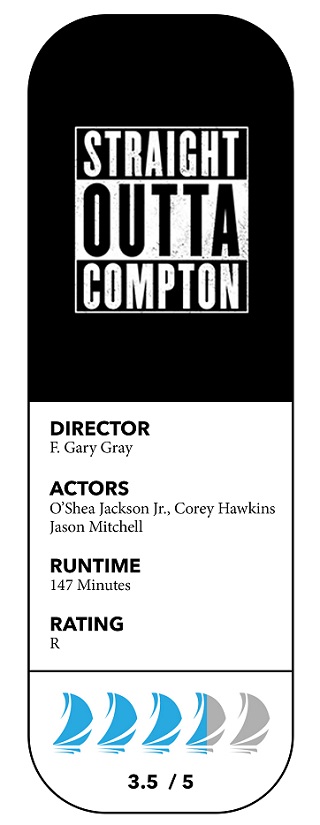
Rapper Ice Cube (played by his son, O’Shea Jackson Jr.) and producer Dr. Dre (Corey Hawkins) are best friends. Dre gets kicked out of his mom’s house and she tells him to get a “real job.” Tired of his job as a DJ at a club that only plays commercial-friendly drivel, Dre consults his drug-dealing friend Eric Wright or Eazy-E (Jason Mitchell) and they set up a record label (Ruthless Records). After a breakthrough single, Eazy-E hires wily-eyed, white manager Jerry Heller (Paul Giamatti, who looks 72) and N.W.A signs with Priority Records.
Straight Outta Compton’s first 45 minutes are enjoyable when the group forms. Early N.W.A’s playful, profane banter and Heller’s awkward transition into rap-manager are equally hilarious. Compton does have a sense of humor — mostly channeled through Mitchell’s fantastic performance that effectively captures Eazy-E’s festive attitude as well as his sincerity. O’Shea Jackson Jr. looks a near-clone of his father and his acting is impressively close to the original.
Ice Cube, Dr. Dre and Eazy-E are the pillars of N.W.A, so they take the film’s primary focus while MC Ren and DJ Yella are relegated to minimal dialogue and forgettable comedic relief. The biopic draws comparisons to Notorious (2009), about the life of the late Biggie Smalls. Notorious triumphed because it primarily recognized Biggie, the man — flaws and all. As Straight Outta Compton relays Ice Cube and Dr. Dre’s historical accounts, this rapper and producer of course come out squeaky-clean in all scenes and their every decision is justified. They really should have been interviewed or consulted, not given a role in making the film.
This is the story of the rise, the fame and the fall of N.W.A, or at least how Ice Cube and Dr. Dre saw it. After N.W.A unravels, the victories of Ice Cube and Dr. Dre aren’t as interesting; they have no flaws or personality, only the adversity they overcome leading to their post-N.W.A successes. Imagine the Bush Administration penning a chapter in a history book about itself.
Biopics need a shade of reality, not just two heroes always on the right side of history. Fortunately, Ice Cube and Dr. Dre don’t suffer the fate of a character like Sean “Puffy” Combs in Notorious (who executive produced). Combs’ character could do no wrong and his dialogue spat endless sappy platitudes.
Eazy-E is the tragic hero with human imperfections: he sells drugs, then proceeds to create a successful record label, become a rap star with his friends, alienate the stars that outshine him (Ice Cube and Dr. Dre), and then deal with financial troubles as the others get famous and leave N.W.A on bitter terms. A few years later, Eazy-E reconciles with Ice Cube and Dr. Dre, aiming to reunite N.W.A. Then he dies of AIDS.
Straight Outta Compton hones in on the cozy relationship between Eazy- E and Heller, pinning N.W.A’s downfall to the Exploitative White Businessman. Heller is unaware of the culture of rap (and African-Americans in general), but he is not naïve to the music industry unlike Eazy-E. Initially Heller is seen as supportive of the entire group. Heller defends N.W.A when they are assaulted by the Los Angeles Police Department due to appearance outside of a studio in 0.4-percent black Torrance; this event supposedly inspires “F— Tha Police”, the infamous N.W.A. classic. Once N.W.A tastes success, Gray and his masters paint Heller as a swindler who coddles Eazy-E and later steals from him. Eazy-E accepts Heller’s favoritism (on tour, Eazy-E and Heller eat lobster while the rest eat burgers) and pays for it later. As great an actor as Giamatti is, his seedy Heller doesn’t stand out, although I feel like it was supposed to.
There are a few scenes Straight Outta Compton could do without. Instead of Compton ending on Eazy-E’s death like it should have, there is a superfluous scene of Dr. Dre leaving Death Row Records. Label-boss Suge Knight (R. Marcus Taylor) is a villain if there ever was one, holding dogfighting matches in the Death Row lobby and pistol whipping people over parking spaces. Knight tells Dre he’ll never make it and asks Dre what he’ll call his new label. Dre overdramatically exits into a bright light like some sort of soap opera and answers the glaring set-up, “Aftermath,” as in Aftermath Records. It seems like a personal statement from Dre, only adding to the exhausting two hour and thirty minute runtime.
Straight Outta Compton thrives in moments where N.W.A deals with its infamy: the famous FBI letter about “F— Tha Police”, the (mostly white) crowds destroying their record in the streets (“Well, they bought them,” Eazy-E laughs) and a hectic Detroit concert. Before the show, Detroit police officers corner the group and tell them not to play that anti-police track. Mid-show, Ice Cube implores Dre to play their signature track and the members of N.W.A are summarily apprehended on stage, sparking a small-scale riot from livid fans.
Director F. Gary Gray is a friend of Ice Cube and Dre; he’s directed videos for both. His films are primarily action or comedy, usually with a bit of overlap. While he’s responsible for the cringe-inducing comedy Be Cool (2005), Gray also directed Friday (1995), which was written by and starred Ice Cube. Friday is the gem of his filmography: a raw take on a young man’s dreary ghetto-life in constant disorder. Friday (also set in Compton) was a delicate balance of hysterical and serious; in Compton things can go from tranquil and humorous to chaotic and life-altering in an instant. Gray tries to project the same dichotomy of comedy and tragedy onto Compton and for the most part succeeds with relatively unknown actors. Gray smoothly interlaces footage regarding the public furor N.W.A caused, the Rodney King trial, and subsequent riots, in which Gray seems to comment on present day attitudes of African-American communities. The police are also vilified (who could have guessed?).
Based on the success Compton has had, expect more big-budget biopics of rap legends in the future. I’m surprised Tupac (as a protagonist) hasn’t received the honor; he’s the subject of so many documentaries. But I’m just here waiting on that Wu Tang biopic, praying to God that RZA doesn’t direct.
The message was the essence of N.W.A. Although Straight Outta Compton does address their notoriety and impact, it focuses heavily on the artist’s post-N.W.A feuds and enterprises. This isn’t a bad thing, and this isn’t a bad movie by any stretch. Like N.W.A’s short career, Straight Outta Compton carries a feeling it was capable of much more. But this is an entertaining, worthwhile movie that fittingly upholds N.W.A’s enormous influence.
—
For more information or news tips, or if you see an error in this story or have any compliments or concerns, contact [email protected].














